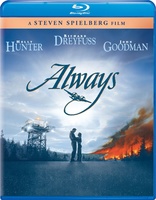Always Blu-ray Movie
HomeAlways Blu-ray Movie 
Universal Studios | 1989 | 122 min | Rated PG | May 05, 2015Movie rating
6.7 | / 10 |
Blu-ray rating
| Users | 4.0 | |
| Reviewer | 3.5 | |
| Overall | 3.5 |
Overview
Always (1989)
Pete Sandich and buddy Al Yackey are daredevil aerial forest-fire fighters. Pete finds true love with Dorinda but when he takes one risk too many, he discovers that fate has other plans for him than a long and happy life with the woman he loves.
Starring: Richard Dreyfuss, Holly Hunter, John Goodman, Brad Johnson (II), Audrey HepburnDirector: Steven Spielberg
| Drama | 100% |
| Romance | 71% |
Specifications
Video
Video codec: MPEG-4 AVC
Video resolution: 1080p
Aspect ratio: 1.85:1
Original aspect ratio: 1.85:1
Audio
English: DTS-HD Master Audio 5.1 (48kHz, 24-bit)
Spanish: Dolby Digital 2.0
French: Dolby Digital 2.0
Subtitles
English SDH, French, Spanish
Discs
50GB Blu-ray Disc
Single disc (1 BD)
Playback
Region A, B (C untested)
Review
Rating summary
| Movie | 4.0 | |
| Video | 4.0 | |
| Audio | 4.0 | |
| Extras | 0.5 | |
| Overall | 3.5 |
Always Blu-ray Movie Review
But Not Forever
Reviewed by Michael Reuben October 18, 2014At the time of this review, Always was available on Blu-ray only as part of the StevenSpielberg Director's Collection. It is now separately available. Always was released during the same year as Indiana Jones and the Last Crusade, and both its smaller scale and its modest box office were judged harshly against the expectations associated with a film directed by Steven Spielberg, whose name was now firmly linked to blockbusters. Always had a few big effects, but it was an intimate character story, almost a romantic comedy (with a few key differences). The film was beautifully photographed and had a lovely score by the reliable John Williams, but where were the thrills? Always is a remake of Victor Fleming's 1943 film A Guy Named Joe starring Spencer Tracy, for which Spielberg and Richard Dreyfuss discovered during the shooting of Jaws that they shared a passionate devotion. After many years in development, the film went into production with a script by Jerry Belson (who had developed The Odd Couple for TV and was one of the many writers who worked with Spielberg on Close Encounters of the Third Kind) that updated the story from World War II to the present but left the outlines of the original story intact. In both his casting choices and direction, however, Spielberg accentuated the story's humor so that the result plays like a kind of rom-com-in-reverse. Always begins with an ideally suited, perfectly matched couple who are deeply in love and already together. With great warmth, occasional humor and much sadness, they then spend the rest of the film saying goodbye and learning how to move on.
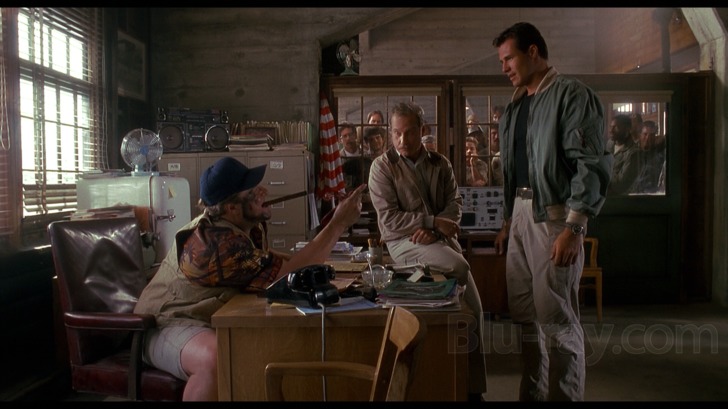
(Note: Certain major plot elements are essential to any discussion of Always. Readers who wish to remain ignorant of the entire plot should skip this review.) Where A Guy Named Joe was set among World War II flyers, Always takes place in the present-day Southwest among a group of daredevil pilots call "Fire Eaters", who battle forest fires by dousing blazes from the air with water and flame retardant. The most daring pilot of the bunch is Pete Sandich (Dreyfuss), who repeatedly tests the limits of his plane and his own mortality. Ostensibly Pete does this to protect the lives of the ground crews led by Don (former Marine Dale Dye), but it's clear to those who know him best that Pete is addicted to the adrenaline rush and the glory of being what his friend and fellow pilot, Al Yackey (John Goodman), calls a "magnificent pagan god!" Pete's girlfriend, Dorinda Durston (Holly Hunter), feels differently. A dispatcher in the air field's tower, Dorinda gets torn up inside whenever she hears Pete on the radio with what she calls his "Evel Knievel voice". Much of their relationship involves their battles over his risk-taking. Even Al is sufficiently concerned to urge Pete to take a job training younger pilots, which Pete won't even consider. The first act of Always plays like a throwback to an earlier era of Hollywood, as Pete, Al and Dorinda trade the kind of snappy, precision-paced dialogue that never happens in real life but is much more interesting than regular conversation. The trio has only a short time in which to convey the essence of relationships that have matured over many years, and Belson's script uses the device of a birthday celebration for Dorinda that isn't really her birthday (because Pete never gets the date right). As Pete and Dorinda dance to "their" song, the Jerome Kern/Otto A. Harbach standard, "Smoke Gets in Your Eyes", while a white light seems to follow them and the grimy-faced crew gapes in awe, Spielberg choreographs the perfect romantic evening. But Dorinda sees troubling portents in the odd blue light that bathes Pete's plane as the couple walks home, and in the same blue light that shines on Pete when he opens her refrigerator. His next mission will prove to be his last. In the afterlife, Pete encounters a beneficent presence named Hap (played with great compassion by Audrey Hepburn, in her final film). Hap tells him that he must now return to earth and be the inspiration to another young pilot, passing on his flying skills just as he himself was once guided by an invisible spirit. As chance (or fate) would have it, Pete's assignment is a pilot named Ted Baker (Brad Johnson), who ran the delivery service that brought Dorinda's present to the birthday party that turned out to be her last night with Pete. Ted's imagination was captured by the Fire Eaters, and he is now trying to enroll in the training school that Al wanted Pete to manage, a job Al took for himself after Pete's death. Pete's initial joy at the opportunity to see his old buddy while fulfilling his afterlife duties is undercut when Al brings Dorinda to the new base to work part time, because he's afraid that she's hiding from the world (which she is). Only then does Peter discover that his assigned flyer, Ted Baker, is in love with his former girlfriend, and that his old friend Al will do everything to encourage the relationship, because he thinks it's good for Dorinda (which it is). The third act of Always involves multiple tricky character arcs. Baker, who was introduced as a sincere but clumsy dufus, has to evolve under Pete's tutelage into the kind of self-assured man of action that both Dorinda and the audience can take seriously. Pete has to grow from a pained and jealous lover holding back Dorinda from the rest of her life to a happy memory urging her forward (an intervention from Hap is required to help Pete fully understand how love works in the afterlife). And Dorinda must finally confront issues that she never resolved with Pete so that she can free herself to move forward, whether with Baker or with somebody else. Both Belson's script and Spielberg's direction walk a fine line between sentimentality on one side and a kind of laughable excess on the other. Whether they succeed in avoiding both extremes is a matter of personal taste (I think they do), but the individual performances by Johnson, Goodman, Dreyfuss and especially Hunter are impeccable. Hunter especially, who was then mostly known for loud, brassy roles like Broadcast News and Raising Arizona, is extraordinary in scenes where she has no dialogue but is simply reacting to communications from Pete that Dorinda experiences as memories, feelings and thoughts. Volumes pass across her face with an eloquence that only the movie camera could capture. Five years later, Hunter would win an Oscar for Best Actress in an entirely speechless role in The Piano, but Spielberg had already discovered her gift for non-verbal expression in Always. Special mention must be made of the late character actor Roberts Blossom, who appeared in Close Encounters declaring that he once saw Bigfoot. Blossom has a memorable scene in Always as an apparently crazy homeless man who, to Pete's astonishment, can hear his ghostly voice. Pete tries to use the old man as a translator, with unexpected and comical results.
Always Blu-ray Movie, Video Quality 
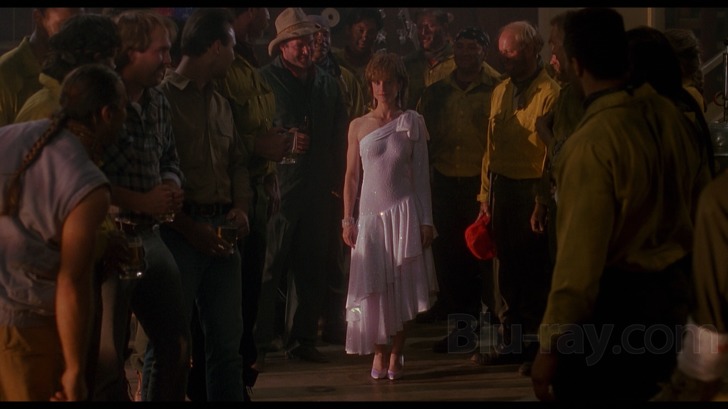
Always was one of the last films shot by Danish cinematographer Mikael Salomon (The Abyss) before he switched entirely to directing. Although the usual criticisms of Universal catalog titles are certain to be leveled at this 1080p, AVC-encoded Blu-ray, fans of the film have reason to celebrate, as the Blu-ray is a huge step up from Universal's 1999 DVD release of Always, which was probably its worst treatment of a Spielberg film on that format: non-anamorphic, with a pale image and far too much aliasing and video noise. The Blu-ray is another story entirely. The greens of the forest, yellows and orange of the flames and reds of the fire retardant are all strong, as are the various shades of blue light that mark Pete and his plane both before and after his crash. The white of Dorinda's dress during the party scene pops out of the frame, as it should, against the smokey brown and yellow background of the firefighter crew surrounding her. Hap's outfit, which came from Audrey Hepburn's personal wardrobe, has an even brighter white glow. Even the red of Marg Helgenberger's hair (in this film, she's what passes for a "plain" girl) is distinctive. Detail is plentiful throughout, although there's somewhat less of it in darker shots where the lighting has been deliberately manipulated to differentiate areas of the frame (a long scene in the cockpit of a plane near the film's end is a noteworthy example). This phenomenon has always been part of the film and is not a fault of the transfer. The film's grain pattern is readily evident, and Universal's frequently heavy hand with digital manipulation is not evident in the final results. The miniature and optical effects used to create some of the flying scenes look remarkably good, with only occasion softness caused by the optical duplication. Universal has mastered Always with an average bitrate of 31.998 Mbps, which is excellent and serves the elaborate scenes of aerial action admirably.
Always Blu-ray Movie, Audio Quality 
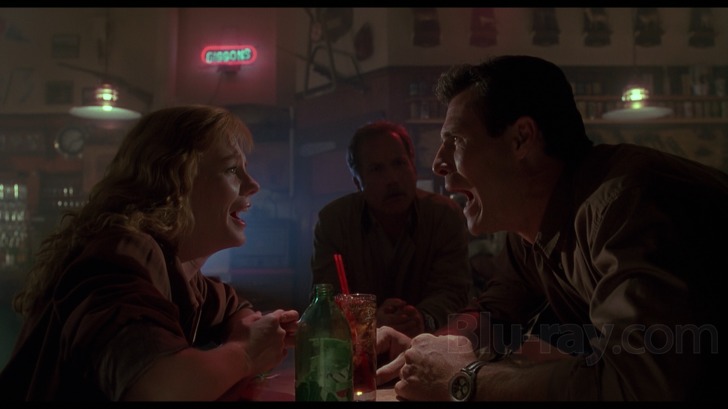
Always was released in Dolby Stereo Surround, and there were also 70mm prints with a six-track mix. The 1999 DVD had a Dolby Digital 4.1 track, which was presumably taken from the unmatrixed Dolby Surround master. The source for the Blu-ray's 5.1 track, presented in lossless DTS-HD MA, is unknown, but it sounds terrific. The flying scenes are the showcase, as the Fire Eaters dive past and into burning trees, scraping their wings (and more) against branches and hearing flames lick at them from all sides. The sound mix puts the viewer into the pilot's seat, which, depending on one's taste for such things, can be either exciting or unnerving. The scenes with the ground crews are equally powerful, with the sound of uncontrolled blazes all over. Scenes near the film's end involving a water escape (I don't want to be more specific for those who haven't seen the film) are equally enveloping. The dialogue is always clear, which is critical for a film with such a literate script. Spielberg's musical alter ego, John Williams, supplied the carefully calibrated score, which traverses the film's complex emotional territory with the composer's characteristic delicacy.
Always Blu-ray Movie, Special Features and Extras 
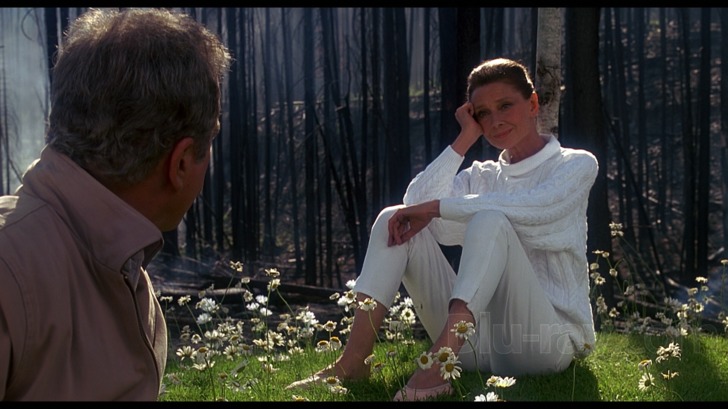
Except for a trailer (480i; 1.85:1; 2:18), the disc has no extras. Universal's 1999 DVD was similarly bare except for a few production notes and cast and crew bios (although it did have an extra trailer that isn't on the Blu-ray).
Always Blu-ray Movie, Overall Score and Recommendation 
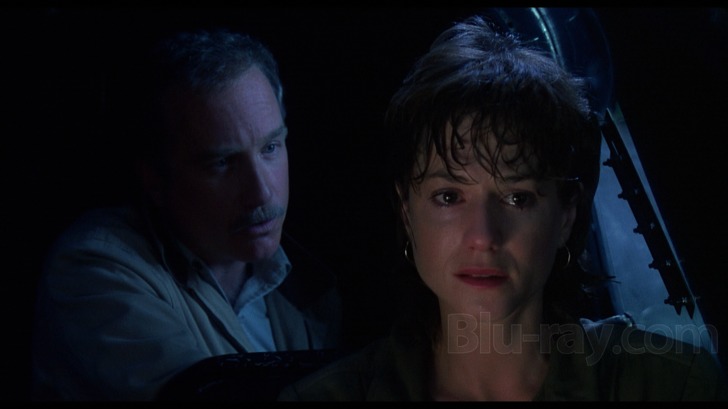
Despite its title, Always is a film drenched in nostalgia for things past—for an older style of movie-making, for an ideal of romantic love that, even by the standards of 1989, might be considered corny; for the excitement of a new relationship before it gets complicated by marriage, family and the practical details of building a life together. It's dangerously simplistic to reduce the interpretation of a film to the details of its director's biography, but Spielberg himself has often said that he could not have made certain films except at particular times in his life, and Always appeared in the same year as his divorce from his first wife—not an inappropriate time in an artist's life to be dealing with themes of letting go and moving on. This new Blu-ray presentation by Universal is by far the best the film has ever looked and, even aside from that easygoing standard, is a fine presentation of the film. With the caveat that Always isn't for everyone, highly recommended.
Similar titles
Similar titles you might also like

45 Years
2015

The Sugarland Express
1974

One from the Heart 4K
1982

Paris, je t'aime
2006

Call Me by Your Name
2017

The Petrified Forest
1936

Wuthering Heights
1970

Damsels in Distress
2011

War & Peace
2016

Little Women
2019

Anna Karenina
2012

Last Tango in Paris
Ultimo tango a Parigi | Uncut Version
1972

The Red Shoes 4K
1948

Limelight
1952

Reflections in a Golden Eye
Warner Archive Collection
1967

(500) Days of Summer
2009

The River
1951

Song to Song 4K
2017

Rust and Bone
De rouille et d'os
2012

A Ghost Story
2017
